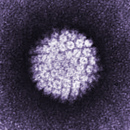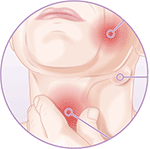
HPV – human papillomavirus – is a common sexually-transmitted infection. HPV infection is the leading cause of cervical cancer in women, and is now being recognized as a major cause of oral cancer. HPV is responsible for 60–70 percent of cancers of the throat, tonsils and tongue.
Who Is At Risk
Oral cancers caused by HPV are significantly higher in men than women.
HPV infection is the most common type of sexually-transmitted infection, so it can affect almost anyone who engages in oral or genital sex. But recently the number of HPV-related oral cancers in men has risen sharply. Men can acquire HPV infection from oral sex, and their immune systems are less effective at fighting HPV than women's.
Things that increase your risk of HPV
- Having oral sex, especially with many partners
- Smoking
- Frequent consumption of alcohol
Warning Signs and Symptoms
Often there is no way to tell that you are infected with HPV. Infection may not cause any symptoms at all, or may cause simple mouth sores that resemble other forms of infection.
Because HPV infection can lead to oral cancer, be on the watch for these symptoms, and alert your physician or dentist if you experience them.
Mouth and throat cancer symptoms
- Ulcers or sores in the mouth that don't heal
- Difficulty swallowing
- A sore throat or hoarse voice that doesn't go away
- A swelling or lump in the mouth or neck
- A numb feeling in the mouth or lips
Self-Exam
Detecting the signs of possible oral cancer early is important. You can perform your own monthly check for oral cancer in just a few minutes at home. See your dentist or oral health professional if you notice anything unusual.
Protecting Yourself
- Regular checkups: Get yearly checkups from a doctor or dentist that include an examination for oral cancer. The exam is brief and easy.
- Sexual hygiene: Fewer sexual partners, staying faithful to one partner at a time, and using a condom when you have sex can all help lower your chances being infected by HPV.
- Vaccination: Current vaccines against types of HPV that cause cervical, anal and other cancers may also help against strains of HPV that cause oral cancer.


